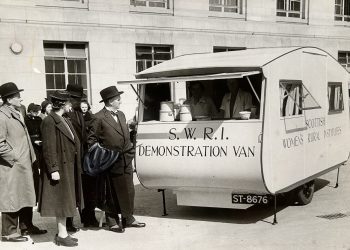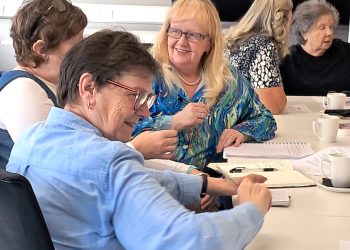Our story & legacy
About us
The SWI’s rich history

The first of the Scottish Women’s Rural Institutes was founded in 1917 in Longniddry, East Lothian, with a clear mission: to empower women, celebrate Scottish culture, and build strong local communities.
Catherine Blair, a passionate Suffragette, founded the organisation to help rural women gain skills, share knowledge, and support each other. It quickly became Scotland’s largest women’s movement, where women learn and share skills, take leadership, and positively impact their communities.
Today, as the SWI, we are proud of our heritage and delighted to remain women supporting women to live their best lives by experiencing lifelong learning, fun and lasting friendships.

Blending traditional values with modern ideas

The SWI is a place where women get together and thrive. They preserve Scottish traditions across a range of subjects and soft skills, including embroidery, baking, and basket-making. They also champion important causes like environmental sustainability and community work. The SWI provides a space for personal growth. Whether that’s gaining confidence, finding your voice, or making lifelong friendships, all boosting wellbeing along the way.
Throughout its history, the SWI has been a powerful force for community development. It has focussed on preserving traditional Scottish crafts, celebrating heritage, and making positive impacts in women’s everyday life.
Today, the SWI helps preserve endangered crafts like Straw Work, Shetland Lace, and Sanquhar knitting. Classes and workshops across Scotland blend traditional values with modern ideas. They build connections, share skills, and empower entrepreneurial women to shape their futures.
Our story is one of resilience, friendship, and growth. Women support each other in the SWI, contributing to Scottish life for over a century and inspiring new generations today.

Our future
The SWI story is an important one with strong feminist roots, emphasising the vital contributions of Scottish women to the nation’s identity. We are deeply committed to sharing Scottish women’s stories, highlighting their often-overlooked contributions that play a vital role in shaping the country’s national identity. Crafts, competitions, and shows matter, but as Scotland’s largest women’s movement, we proudly celebrate and promote our achievements.
The SWI Heritage Project, supported by the National Lottery Heritage Fund, showcases the SWI’s impact in Scotland and preserves its legacy for future generations.
The project archives, digitises, and preserves physical artefacts and records, safeguarding the SWI’s nationally significant heritage. Additionally, the project records memories from rural women involved with the SWI for decades, preserving their often-overlooked experiences for future generations. The project has generated significant interest from experts and academics, who recognise the importance of the SWI’s collection to the nation.






























